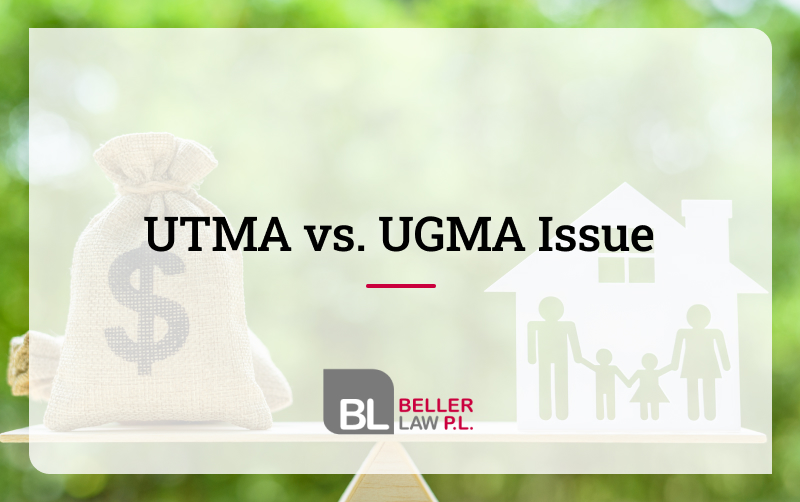
Understanding UGMA and UTMA Accounts
Choosing the proper custodial account for your minor depends on understanding the fundamental differences between UGMA and UTMA accounts. Each has distinct features that cater to different financial planning needs.
What Is a UGMA Account?
The Uniform Gifts to Minors Act (UGMA) account is a custodial account allowing minors to receive gifts without the need for a trust. It provides a straightforward way to transfer assets to a minor, who can access them once reaching the age of majority, which is 18 in Florida. In addition, critical aspects of a UGMA account include the following:
- Age of termination—the minor gains full control of the assets at 18;
- Types of assets—UGMA accounts primarily allow financial assets like cash, stocks, bonds, and mutual funds; and
- Custodial control—the custodian manages the account until the minor reaches the age of majority.
UGMA accounts are ideal for those who want a simple and efficient way to transfer financial assets to minors. However, once the minor reaches 18, the person has complete control of the assets, which may not align with your long-term financial planning goals.
What Is a UTMA Account?
The Uniform Transfers to Minors Act (UTMA) account offers more flexibility than those under the UGMA. UTMA accounts can hold a broader range of assets and extend the termination age to 21 in Florida, providing custodians with a more extended period to manage the assets on behalf of the minor. Some important facets of a UTMA account include the following:
- Age of termination—in Florida, the minor gains control at 21, providing more time to mature before having access to the funds;
- Types of assets—UTMA accounts can include real estate, patents, royalties, and even works of art, in addition to financial assets; and
- Custodial control—the custodian manages the assets until the minor reaches 21, offering extended oversight.
UTMA accounts are advantageous for those wishing to transfer a broader range of assets and maintain custodial control for longer. This flexibility can be beneficial for more complex financial planning needs.
Key Differences and Considerations
Understanding the key differences and considerations between UGMA vs. UTMA accounts is crucial for making the right choice.
Age of Termination
One of the primary considerations in the UGMA vs. UTMA decision is the age at which the minor gains control of the assets. UGMA accounts terminate at 18, while UTMA accounts in Florida extend this to 21. This difference can significantly impact your planning, especially if you believe the minor may need more time to develop financial maturity.
Types of Assets Allowed
Another crucial factor is the type of assets you plan to transfer. UGMA accounts are limited to financial assets, whereas UTMA accounts offer more flexibility, accommodating real estate and other non-traditional assets. This flexibility can be crucial for families with diverse asset portfolios.
Custodial Control
The length of custodial control is also a key consideration. With UGMA accounts, control ends at 18, potentially giving young adults control over significant assets before they are financially mature. With control extending to 21, UTMA accounts allow more time for the custodian to manage the assets, which can help ensure the minor is better prepared to handle their finances.
Consulting with a Florida estate planning attorney can provide personalized advice and help you align your financial planning with your goals.
Can You Touch Assets in a UGMA or UTMA Account Before the Minor Reaches the Age of Majority?
Custodial accounts help parents and others give their children a leg up in life by setting them up with money they can use as they build their own careers and sources of income. It is essentially a savings or investment account that benefits minors when they come of age. The assets you put into such an account are irrevocable gifts.
But can you withdraw assets or money from these accounts before transferring it to the minor? The answer is yes, but that ability comes with strict limitations.
Custodian Responsibilities
The custodian of the account has a fiduciary duty to manage the assets in the best interest of the minor. For instance, suppose you need money to pay for the child’s private high school tuition. In that case, you would likely be allowed to access the funds in the custodial account.
That is the essential rule—all withdrawals must directly benefit the minor. However, providers may not allow you to take assets out to pay for things like groceries, electric bills, or routine childcare expenses. The rules vary somewhat depending on which provider you opened the account with. So, if you desire flexibility, you should speak with various providers, financial planners, or your lawyer about which provider is right for you.
Prohibited Uses
Custodians cannot use the assets for their personal benefit or for expenses that do not directly benefit the minor. Misusing the funds can lead to legal consequences and the removal of the custodian.
Documentation and Transparency
It’s crucial for custodians to maintain thorough documentation of all transactions and uses of the account assets. This transparency ensures that the funds are being used appropriately and protects the custodian in case of any disputes.
UGMA vs. UTMA: What’s Right for You?
If you are wrestling with the difference between UTMA vs. UGMA accounts and which will best serve your needs, reach out to the dedicated estate planning attorneys at Beller Law, PL. At Beller Law, PL, we take pride in providing our clients with all the information they need to make the best decisions for their families’ futures. We understand the nature of our business can be complex, so we take as much time as we need to explain everything in understandable terms. Our goals are to ensure you feel confident with your decision and that the selected course of action is in your family’s best interest. To schedule a no-obligation consultation today, give us a call or connect with us through our secure online contact form.
